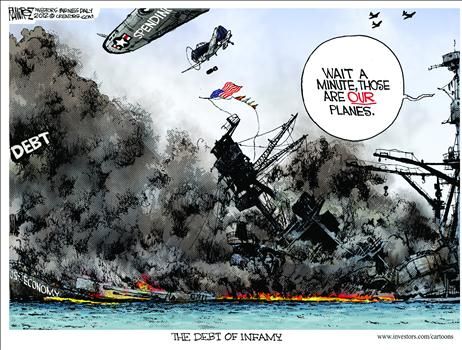By James Pethokoukis | 14 October 2014, 2:29 pm
Paul
Krugman on America’s budget situation and outlook:
But isn’t the falling deficit just a short-term blip, with the long-run outlook as dire as ever? Actually, no. Falling deficits right now have a lot to do with a strengthening economy plus some of that “mindless austerity” the president condemned. But there has also been a dramatic slowdown in the growth of health spending — and if that continues, the long-run fiscal outlook is much better than anyone thought possible not long ago. Yes, current projections still show a rising ratio of debt to G.D.P. starting some years from now, and uncomfortable levels of debt a generation from now. But given all the clear and present dangers we face, it’s hard to see why dealing with that distant and uncertain prospect should be any kind of policy priority.
Well, let’s see what the nervous Nellies at the Congressional
Budget Office have to say. The above chart is CBO’s
extended alternative scenario, which assumes “certain policies that have been
in place for a number of years will be continued and that some provisions of
law that might be difficult to sustain for a long period will be modified.”
It also tries to incorporate the economic impact of continually rising
debt. As you can see, by 2039 — just 25 years from now — we are perhaps
looking at a publicly-held debt of 183% of GDP vs. about 75% today and half
that before the Great Recession. So basically a quintupling of the debt in a
generation. And a more heavily indebted and poorer American than otherwise. And
the longer we wait to make structural spending reforms, the more dramatic those
changes will need be.

I would guess that Krugman, and many others on the left, would like to
increase spending on all kinds of things: infrastructure, expanded healthcare
subsidies, and universal pre-k among other “clear and present dangers.” So
that’s where they want the public’s focus to stay. And when the time comes to
address the growing debt, grab a VAT off the shelf. Or maybe that day will
never come.

Left-liberal
economist Brad DeLong has speculated on a scenario
where rates stay low forever:
… we may well find ourselves in a situation in which the U.S; government can simply borrow and borrow and never have to pay it back because the economy grows faster than interest accrues. In which case the U.S. government looks much more like the Renaissance Medici Bank–an organization you are happy to pay to keep your money safe, rather than a debtor from whom you demand a healthy return. The treasury becomes a profit center for the government rather than a cost.
I wonder how much the Medici Bank scenario is fueling the left’s blasé attitude
about the debt.




No comments:
Post a Comment